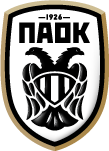Child and Youth Protection and Welfare Policy
PAOK FC’s strategy regarding the protection and safeguarding of the welfare of children and young footballers in the club’s player development departments, as well as ensuring that the environment of the activities organized is safe, is fully aligned with the UEFA guidelines.
In addition, these guidelines are proposed to be adopted by amateur clubs, partners – satellites of the PAOK FC developmental departments.
For the PAOK FC developmental departments, child protection and welfare is a key responsibility and focuses on ensuring that football is a safe, positive and enjoyable experience for all young players. Our responsibility is to all young athletes and our goal is to keep them safe from harm (including abuse) when participating in football, in all age groups and at all levels.
The definition of protection and welfare of the child includes preventive actions, such as minimizing the chances of problems arising and ensuring that, when and if concerns arise, they are addressed appropriately.
Abuse is not only focused on sexual harassment, the program manager as well as the PAOK Academy executives operate on the basis of following the UEFA Safeguarding Toolkit and recognize the following terms as follows:
Physical Abuse: Physical abuse can be, but is not limited to, any type of hitting, shaking, burning, pinching, biting, choking, throwing, beating or other action that causes physical injury, leaves marks or causes pain.
Sexual Abuse: Sexual abuse is any type of sexual contact between an adult and any person under the age of 18, between a significantly older child and a younger child, or when one person dominates another, regardless of age. It also includes actions such as taking indecent photographs of children, encouraging them to view sexually explicit videos or photos, and even unwanted comments with inappropriate language.
Psychological Abuse: Emotional abuse occurs when a significant adult in a child’s life repeatedly criticizes, threatens, or rejects them until the child loses their self-esteem and sense of self-worth. Constructive criticism is important for children to learn and improve. Similarly, jokes and laughter help and form bonds between people and can create a sense of team spirit. However, the difference is that emotional abuse begins when criticism stops motivating and jokes are not fun, lowering the young player’s self-esteem.
Neglect: Neglect occurs when an adult intentionally does not provide enough emotional support and gives little or no attention to a child. Also, when a child does not have adequate food, shelter, clothing, medical care, or supervision are examples of neglect.
Bullying: Although abuse is usually considered something that an adult does to a child, peers can also commit abuse. Child-to-child abuse is called «bullying». Bullying can take many forms. It can include physical acts such as hitting, online activity such as threatening messages, comments or images posted on social media, theft of property, etc. Bullying can be based on someone’s gender, ethnicity, athletic ability, etc. The identification process is not easy, it is usually stated by the testimony of the child who has been abused or mistreated or stated by the testimony of another child, friend – teammate, or an adult. Before the bullying there are signs that indicate that something is not normal. This does not necessarily mean that it has happened, however, the signs of abuse should be investigated and examined.
PAOK FC, as a club actively operating for the protection and welfare of children in collaboration with the relevant institutions, national legislation and UEFA guidelines, has created a child protection and welfare program based on 5 objectives.
-
Laying the foundations for the protection and welfare of children: This includes informing, educating and training all executives and associates regarding the definitions (e.g. child, abuse, physical – psychological violence), as mentioned above, as well as the procedures and policy followed in each case.
-
Ensuring organizational preparedness and prevention: This includes establishing and adhering to procedures and practices that will help avoid situations of abuse.
-
Awareness: Efforts include education and communication. Communication and education are essential to ensure understanding of safeguarding measures, principles and what they mean for everyone in football.
-
Working with agencies and reporting concerns: This includes responding to concerns, if and when they arise, and determining how to engage external agencies and organisations that need to be involved to protect children.
-
Measuring and providing feedback on processes for the welfare and protection of young athletes: This includes monitoring progress and identifying best practices and processes for those working in football.






































